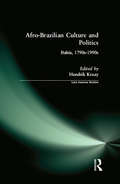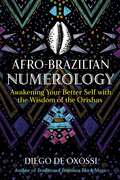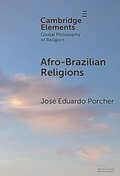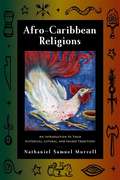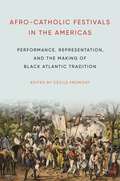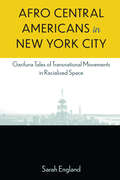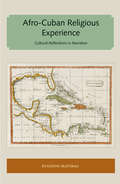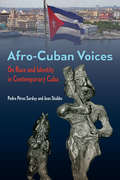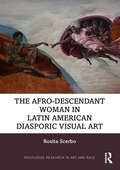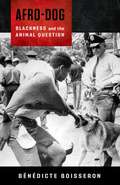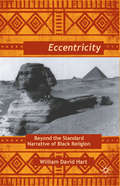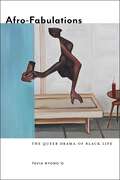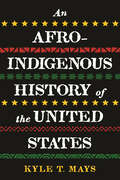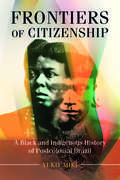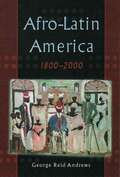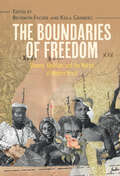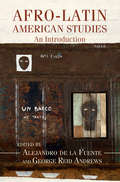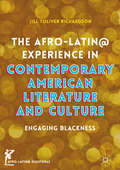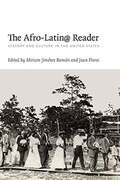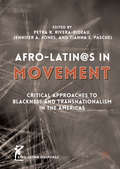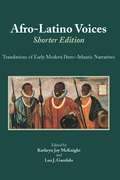- Table View
- List View
Afro-Brazilian Culture and Politics: Bahia, 1790s-1990s (Latin American Realities Ser.)
by Hendrik KraayThe essays in this book constitute an analytic survey of the last two centuries of Afro-Bahian history, with a focus squarely on the difficult relationship between Afro- and Euro-Bahia and on the continual Afro-Bahian struggle to create a meaningful culture in an environment either hostile or suffocating in its ability to absorb elements of Afro-Bahian culture.
Afro-Brazilian Numerology: Awakening Your Better Self with the Wisdom of the Orishas
by Diego de Oxóssi• Offers step-by-step instructions to calculate your Birth Odus and cast your full Orisha Birth Chart• Presents detailed interpretations of each of the 16 Birth Odus, showing how their energies manifest in an individual&’s personality, relationships, financial status, and general approach to life• Shares self-transformation techniques to help you improve the positive qualities of your chart while embracing, integrating, and neutralizing negative energies and tendenciesMuch like the celestial influences revealed by a natal astrology chart or the numerology of your birth date, African spiritual traditions believe that every person has specific personal energies ruling how we relate to each other and the way we foresee and achieve life goals. Called the birth Odus, these inner energies influence your choices and decisions throughout life, defining and differentiating you from everyone else--and revealing the best ways to maximize your potential and meet the challenges you face. Offering a complete guide to discovering, interpreting, and working with your birth Odus, Diego de Oxóssi details step by step how to calculate your birth Odus and cast your full Orisha birth Chart. He explains the Afro-Brazilian concept of numerology and its relationship with the 16 Odus and their related Orishas, the deities of the Afro-Brazilian spiritual tradition. He explores how to determine the influences in the major and minor houses of your Orisha birth chart, including those related to personality and identity, career and success, relationships and love, and challenges and personal evolution. Presenting case studies from his practice, the author offers detailed interpretations of each of the 16 birth Odus, showing how their energies manifest in an individual&’s life. He looks at the positive and negative aspects of each Odu, including how the negative aspects represent the shadow forces that one has to overcome to succeed in life. He offers self- transformation techniques to help you improve the positive qualities of your chart while embracing, integrating, and neutralizing the negative energies and tendencies. Revealing how to better know yourself and understand the spiritual dynamics behind your choices and behaviors, this guide shows you how to work with the energies of the Odus and the strength of the Orishas to improve your communication and relationship skills, overcome life&’s challenges, and ensure success and happiness on your life&’s path.
Afro-Brazilian Religions (Elements in Global Philosophy of Religion)
by José Eduardo PorcherThis Element introduces Afro-Brazilian religions and underscores the necessity for an expanded methodological framework to encompass these traditions in the philosophy of religion. It emphasizes the importance of incorporating overlooked sources like mythic narratives and ethnographies while acknowledging the pivotal role of material culture in cognitive processes. Furthermore, it advocates for adopting an embodiment paradigm to facilitate the development of a philosophy of religious practice. The Element illustrates this approach by examining phenomena often neglected in philosophical discussions on religion, such as sacrifice and spirit possession, and delves into the ontological commitments and implications of these practices. It also stresses the significance of employing thick descriptions and embracing interdisciplinary dialogue to cultivate a globally inclusive philosophy of religion, capable of engaging with phenomena frequently sidelined within the mainstream.
Afro-Caribbean Religions: An Introduction to Their Historical, Cultural, and Sacred Traditions
by Murrell Nathaniel SamuelReligion is one of the most important elements of Afro-Caribbean culture linking its people to their African past, from Haitian Vodou and Cuban Santeria—popular religions that have often been demonized in popular culture—to Rastafari in Jamaica and Orisha-Shango of Trinidad and Tobago. In Afro-Caribbean Religions, Nathaniel Samuel Murrell provides a comprehensive study that respectfully traces the social, historical, and political contexts of these religions. And, because Brazil has the largest African population in the world outside of Africa, and has historic ties to the Caribbean, Murrell includes a section on Candomble, Umbanda, Xango, and Batique. This accessibly written introduction to Afro-Caribbean religions examines the cultural traditions and transformations of all of the African-derived religions of the Caribbean along with their cosmology, beliefs, cultic structures, and ritual practices. Ideal for classroom use, Afro-Caribbean Religions also includes a glossary defining unfamiliar terms and identifying key figures.
Afro-Catholic Festivals in the Americas: Performance, Representation, and the Making of Black Atlantic Tradition (Africana Religions #2)
by Cécile FromontThis volume demonstrates how, from the beginning of the Atlantic slave trade, enslaved and free Africans in the Americas used Catholicism and Christian-derived celebrations as spaces for autonomous cultural expression, social organization, and political empowerment. Their appropriation of Catholic-based celebrations calls into question the long-held idea that Africans and their descendants in the diaspora either resignedly accepted Christianity or else transformed its religious rituals into syncretic objects of stealthy resistance.In cities and on plantations throughout the Americas, men and women of African birth or descent staged mock battles against heathens, elected Christian queens and kings with great pageantry, and gathered in festive rituals to express their devotion to saints. Many of these traditions endure in the twenty-first century. The contributors to this volume draw connections between these Afro-Catholic festivals—observed from North America to South America and the Caribbean—and their precedents in the early modern kingdom of Kongo, one of the main regions of origin of men and women enslaved in the New World. This transatlantic perspective offers a useful counterpoint to the Yoruba focus prevailing in studies of African diasporic religions and reveals how Kongo-infused Catholicism constituted a site for the formation of black Atlantic tradition.Afro-Catholic Festivals in the Americas complicates the notion of Christianity as a European tool of domination and enhances our comprehension of the formation and trajectory of black religious culture on the American continent. It will be of great interest to scholars of African diaspora, religion, Christianity, and performance.In addition to the editor, the contributors include Kevin Dawson, Jeroen Dewulf, Junia Ferreira Furtado, Michael Iyanaga, Dianne M. Stewart, Miguel A. Valerio, and Lisa Voigt.
Afro-Catholic Festivals in the Americas: Performance, Representation, and the Making of Black Atlantic Tradition (Africana Religions)
by Cécile FromontThis volume demonstrates how, from the beginning of the Atlantic slave trade, enslaved and free Africans in the Americas used Catholicism and Christian-derived celebrations as spaces for autonomous cultural expression, social organization, and political empowerment. Their appropriation of Catholic-based celebrations calls into question the long-held idea that Africans and their descendants in the diaspora either resignedly accepted Christianity or else transformed its religious rituals into syncretic objects of stealthy resistance.In cities and on plantations throughout the Americas, men and women of African birth or descent staged mock battles against heathens, elected Christian queens and kings with great pageantry, and gathered in festive rituals to express their devotion to saints. Many of these traditions endure in the twenty-first century. The contributors to this volume draw connections between these Afro-Catholic festivals—observed from North America to South America and the Caribbean—and their precedents in the early modern kingdom of Kongo, one of the main regions of origin of men and women enslaved in the New World. This transatlantic perspective offers a useful counterpoint to the Yoruba focus prevailing in studies of African diasporic religions and reveals how Kongo-infused Catholicism constituted a site for the formation of black Atlantic tradition.Afro-Catholic Festivals in the Americas complicates the notion of Christianity as a European tool of domination and enhances our comprehension of the formation and trajectory of black religious culture on the American continent. It will be of great interest to scholars of African diaspora, religion, Christianity, and performance.In addition to the editor, the contributors include Kevin Dawson, Jeroen Dewulf, Junia Ferreira Furtado, Michael Iyanaga, Dianne M. Stewart, Miguel A. Valerio, and Lisa Voigt.
Afro Central Americans in New York City: Garifuna Tales of Transnational Movements in Racialized Space
by Sarah EnglandDescended from African maroons and the Island Carib on colonial St. Vincent, and later exiled to Honduras, the Garifuna way of life combines elements of African, Island Carib, and colonial European culture. Beginning in the 1940s, this cultural matrix became even more complex as Garifuna began migrating to the United States, forming communities in the cities of New York, New Orleans, and Los Angeles. Moving between a village on the Caribbean coast of Honduras and the New York City neighborhoods of the South Bronx and Harlem, England traces the daily lives, experiences, and grassroots organizing of the Garifuna.Concentrating on how family life, community life, and grassroots activism are carried out in two countries simultaneously as Garifuna move back and forth, England also examines the relationship between the Garifuna and Honduran national society and discusses much of the recent social activism organized to protect Garifuna coastal villages from being expropriated by the tourism and agro-export industries.Based on two years of fieldwork in Honduras and New York, her study examines not only how this transnational system works but also the impact that the complex racial and ethnic identity of the Garifuna have on the surrounding societies. As a people who can claim to be Black, Indigenous, and Latino, the Garifuna have a complex relationship not only with U.S. and Honduran societies but also with the international community of nongovernmental organizations that advocate for the rights of Indigenous peoples and blacks.Publication of the paperback edition made possible by a Sustaining the Humanities through the American Rescue Plan grant from the National Endowment for the Humanities.
Afro-Cuban Religious Experience: Cultural Reflections in Narrative (Florida and the Caribbean Open Books Series)
by Eugenio MatibagThe books in the Florida and the Caribbean Open Books Series demonstrate the University Press of Florida’s long history of publishing Latin American and Caribbean studies titles that connect in and through Florida, highlighting the connections between the Sunshine State and its neighboring islands. Books in this series show how early explorers found and settled Florida and the Caribbean. They tell the tales of early pioneers, both foreign and domestic. They examine topics critical to the area such as travel, migration, economic opportunity, and tourism. They look at the growth of Florida and the Caribbean and the attendant pressures on the environment, culture, urban development, and the movement of peoples, both forced and voluntary. The Florida and the Caribbean Open Books Series gathers the rich data available in these architectural, archaeological, cultural, and historical works, as well as the travelogues and naturalists’ sketches of the area in prior to the twentieth century, making it accessible for scholars and the general public alike. The Florida and the Caribbean Open Books Series is made possible through a grant from the National Endowment for the Humanities and the Andrew W. Mellon Foundation, under the Humanities Open Books program.
Afro-Cuban Voices: On Race and Identity in Contemporary Cuba (Contemporary Cuba)
by Pedro Pérez Sarduy Jean StubbsFrom the forewords: "At a time when Cuba is undergoing immense economic and social changes, race becomes a kind of cultural litmus test for the national identity. . . . This anthology illustrates fully that it is possible to be both revolutionary and black in Cuba."—Manning Marable, Columbia University "The authors of Afro-Cuban Voices, also key actors in the new, unfolding dialogue about race in Cuba, make a seminal contribution through a forthright critique of ‘racial blind spots’ in official history and present-day racial discrimination."—James Early, director of cultural studies and communication, Smithsonian Institution From the series editor: "A courageous attempt to deal head-on with the issue of race in Cuba today. . . . Pérez Sarduy and Stubbs [seek to] put a human face on this debate, and do so well. The book will be received with relief by some and with frustration by others. Controversial it will undoubtedly be, since—as with most things Cuban—strong emotions are a given assumption. It will be an admirable beginning for the series and, it is hoped, will spark a much-needed debate in the United States on many aspects of the ‘Cuban question.’ It is about time."—John M. Kirk Based on the vivid firsthand testimony of prominent Afro-Cubans who live in Cuba, this book of interviews looks at ways that race affects daily life on the island. While celebrating their racial and national identity, the collected voices express an urgent need to end the silences and distortions of history in both pre- and postrevolutionary Cuba. The 14 people interviewed—of different generations and from different geographic areas of Cuba—come from the arts, the media, industry, academia, and medicine. They include a doctor who calls for joint U.S.-Cuban studies on high blood pressure and a craftsman who makes the batá drums used in Yoruba worship ceremonies. All responded to four controversial questions: What is it like to be black in Cuba? How has the revolution made a difference? To what extent is that difference true today? What can be done? Exposing the contradictions of both racial stereotyping and cultural assimilation, their eloquent answers make the case that the issue of race in Cuba, no matter how hard to define, will not be ignored. A volume in the series Contemporary Cuba, edited by John M. Kirk
The Afro-Descendant Woman in Latin American Diasporic Visual Art (Routledge Research in Art and Race)
by Rosita ScerboBy studying multiple cultural expressions of Blackness throughout different regions of the Americas, the chapters of this book consider the relationship that social and historical processes such as sovereignty and colonialism have on cultural productions made by and about Black Latin American women.Rosita Scerbo analyzes a range of power dynamics as represented in different artistic media of the Afro-Latin/x American community, including photography, muralism, performance, paintings, and digital art. The book acknowledges that racial and gender equity cannot exist without Intersectionality and that is why the entirety of the chapters focus on cultural and visual productions exclusively created by Afro-descendant women. The Black Latin American women featured in the various chapters, spanning multiple artistic mediums and originating from various Latin American and Caribbean nations, including Mexico, Colombia, the Dominican Republic, Puerto Rico, Brazil, and Cuba, collectively pursue the central aim of foregrounding the Afro-descendant woman’s experience. Simultaneously, they strive to enhance the visibility and acknowledgment of gendered Afro-diasporic culture within the Latin American context.The book will be of interest to scholars working in art history, gender studies, women’s studies, Latin American studies, African diaspora studies, and race and ethnic studies.
Afro-Dog: Blackness and the Animal Question
by Bénédicte BoisseronThe animal-rights organization PETA asked “Are Animals the New Slaves?” in a controversial 2005 fundraising campaign; that same year, after the Humane Society rescued pets in the aftermath of Hurricane Katrina while black residents were neglected, some declared that white America cares more about pets than black people. These are but two recent examples of a centuries-long history in which black life has been pitted against animal life. Does comparing human and animal suffering trivialize black pain, or might the intersections of racialization and animalization shed light on interlinked forms of oppression?In Afro-Dog, Bénédicte Boisseron investigates the relationship between race and the animal in the history and culture of the Americas and the black Atlantic, exposing a hegemonic system that compulsively links and opposes blackness and animality to measure the value of life. She analyzes the association between black civil disobedience and canine repression, a history that spans the era of slavery through the use of police dogs against protesters during the civil rights movement of the 1960s to today in places like Ferguson, Missouri. She also traces the lineage of blackness and the animal in Caribbean literature and struggles over minorities’ right to pet ownership alongside nuanced readings of Derrida and other French theorists. Drawing on recent debates on black lives and animal welfare, Afro-Dog reframes the fast-growing interest in human–animal relationships by positioning blackness as a focus of animal inquiry, opening new possibilities for animal studies and black studies to think side by side.
Afro-Eccentricity: Beyond the Standard Narrative of Black Religion
by William David HartAfro-Eccentricity explores three overlapping stories of Black Religion: the Soul, Black Church, and Ancestor Narratives. Hart contends that these narratives dominate most accounts of Black Religion that, collectively, he calls the "Standard Narrative of Black Religion. "
Afro-Fabulations: The Queer Drama of Black Life (Sexual Cultures #14)
by Tavia Nyong'oWinner, 2019 Barnard Hewitt Award for Outstanding Research in Theatre History, given by the American Society for Theatre ResearchHonorable Mention, 2021 Errol Hill Award, given by the American Society for Theatre ResearchArgues for a conception of black cultural life that exceeds post-blackness and conditions of loss In Afro-Fabulations: The Queer Drama of Black Life, cultural critic and historian Tavia Nyong’o surveys the conditions of contemporary black artistic production in the era of post-blackness. Moving fluidly between the insurgent art of the 1960’s and the intersectional activism of the present day, Afro-Fabulations challenges genealogies of blackness that ignore its creative capacity to exceed conditions of traumatic loss, social death, and archival erasure.If black survival in an anti-black world often feels like a race against time, Afro-Fabulations looks to the modes of memory and imagination through which a queer and black polytemporality is invented and sustained. Moving past the antirelational debates in queer theory, Nyong’o posits queerness as “angular sociality,” drawing upon queer of color critique in order to name the gate and rhythm of black social life as it moves in and out of step with itself. He takes up a broad range of sites of analysis, from speculative fiction to performance art, from artificial intelligence to Blaxploitation cinema. Reading the archive of violence and trauma against the grain, Afro-Fabulations summons the poetic powers of queer world-making that have always been immanent to the fight and play of black life.
An Afro-Indigenous History of the United States
by Kyle T. MaysThe first intersectional history of the Black and Native American struggle for freedom in our country that also reframes our understanding of who was Indigenous in early AmericaBeginning with pre-Revolutionary America and moving into the movement for Black lives and contemporary Indigenous activism, Afro-Indigenous historian, Kyle T. Mays argues that the foundations of the US are rooted in antiblackness and settler colonialism, and that these parallel oppressions continue into the present. He explores how Black and Indigenous peoples have always resisted and struggled for freedom, sometimes together, and sometimes apart. Whether to end African enslavement and Indigenous removal or eradicate capitalism and colonialism, Mays show how the fervor of Black and Indigenous peoples calls for justice have consistently sought to uproot white supremacy.Mays uses a wide-array of historical activists and pop culture icons, &“sacred&” texts, and foundational texts like the Declaration of Independence and Democracy in America. He covers the civil rights movement and freedom struggles of the 1960s and 1970s, and explores current debates around the use of Native American imagery and the cultural appropriation of Black culture. Mays compels us to rethink both our history as well as contemporary debates and to imagine the powerful possibilities of Afro-Indigenous solidarity.
Afro-Latin America: Black Lives, 1600-2000
by George Reid AndrewsOf the almost 11 million Africans who came to the Americas between 1500 and 1870, two-thirds came to Spanish America and Brazil. Over four centuries, Africans and their descendants—both free and enslaved—participated in the political, social, and cultural movements that indelibly shaped their countries’ colonial and post-independence pasts. Yet until very recently Afro-Latin Americans were conspicuously excluded from narratives of their hemisphere’s history.<P><P> George Reid Andrews seeks to redress this damaging omission by making visible the past and present lives and labors of black Latin Americans in their New World home. He cogently reconstructs the Afro-Latin heritage from the paper trail of slavery and freedom, from the testimonies of individual black men and women, from the writings of visiting African-Americans, and from the efforts of activists and scholars of the twentieth century to bring the Afro-Latin heritage fully into public view.<P> While most Latin American countries have acknowledged the legacy of slavery, the story still told throughout the region is one of “racial democracy”—the supposedly successful integration and acceptance of African descendants into society. From the 1970s to today, black civil rights movements have challenged that narrative and demanded that its promises of racial equality be made real. They have also called for fuller acknowledgment of Afro-Latin Americans’ centrality in their countries’ national histories. Afro-Latin America brings that story up to the present, examining debates currently taking place throughout the region on how best to achieve genuine racial equality.
Afro-Latin America: A Black and Indigenous History of Postcolonial Brazil (Afro-Latin America)
by Yuko MikiFrontiers of Citizenship is an engagingly-written, innovative history of Brazil's black and indigenous people that redefines our understanding of slavery, citizenship, and the origins of Brazil's 'racial democracy'. Through groundbreaking archival research that brings the stories of slaves, Indians, and settlers to life, Yuko Miki challenges the widespread idea that Brazilian Indians 'disappeared' during the colonial era, paving the way for the birth of Latin America's largest black nation. Focusing on the postcolonial settlement of the Atlantic frontier and Rio de Janeiro, Miki argues that the exclusion and inequality of indigenous and African-descended people became embedded in the very construction of Brazil's remarkably inclusive nationhood. She demonstrates that to understand the full scope of central themes in Latin American history - race and national identity, unequal citizenship, popular politics, and slavery and abolition - one must engage the histories of both the African diaspora and the indigenous Americas.
Afro-Latin America, 1800-2000
by George Reid AndrewsWhile the rise and abolition of slavery and ongoing race relations are central themes of the history of the United States, the African diaspora actually had a far greater impact on Latin and Central America. More than ten times as many Africans came to Spanish and Portuguese America as the United States. <p><p>In this, the first history of the African diaspora in Latin America from emancipation to the present, George Reid Andrews deftly synthesizes the history of people of African descent in every Latin American country from Mexico and the Caribbean to Argentina. He examines how African peooples and their descendants made their way from slavery to freedom and how they helped shape and responded to political, economic, and cultural changes in their societies. Individually and collectively they pursued the goals of freedom, equality, and citizenship through military service, political parties, civic organizations, labor unions, religious activity, and other avenues. <p><p>Spanning two centuries, this tour de force should be read by anyone interested in Latin American history, the history of slavery, and the African diaspora, as well as the future of Latin America.
Afro-Latin American Studies: An Introduction (Afro-latin America )
by George Reid Andrews Alejandro De La FuenteAlejandro de la Fuente and George Reid Andrews offer the first systematic, book-length survey of humanities and social science scholarship on the exciting field of Afro-Latin American studies. Organized by topic, these essays synthesize and present the current state of knowledge on a broad variety of topics, including Afro-Latin American music, religions, literature, art history, political thought, social movements, legal history, environmental history, and ideologies of racial inclusion.<P><P> This volume connects the region's long history of slavery to the major political, social, cultural, and economic developments of the last two centuries. Written by leading scholars in each of those topics, the volume provides an introduction to the field of Afro-Latin American studies that is not available from any other source and reflects the disciplinary and thematic richness of this emerging field.<P> Presents systematic and synthetic overviews of recent scholarship on topics of major importance in the field of Afro-Latin American studies, for example Afro-Latin American religions, Afro-Latin American political movements, and Afro-Latin American music. Covers a broad range of topics, embracing most of the humanities and social sciences.<P> Serves as the authoritative introduction for Afro-Latin American history, covering the period from 1500 to the present.<P>
The Afro-Latin Diaspora: Awakening Ancestral Memory, Avoiding Cultural Amnesia
by Jameelah Xochitl MedinaThis bookis Jameelah's contribution to avoiding Afro-Latin American cultural andhistorical amnesia. This book highlights the many contributions of theseforgotten people of Latin America, including African and Afro-Latin Americanheroes and freedom-fighters, religious and cultural traditions, and currentsocial issues of ethnic and cultural identity.
The Afro-Latin@ Experience in Contemporary American Literature and Culture
by Jill Toliver RichardsonThis book examines contemporary Afro-Latin@ literature and its depiction of the multifaceted identity encompassing the separate identifications of Americans and the often-conflicting identities of blacks and Latin@s. The Afro-Latin@ Experience in Contemporary American Literature and Culture highlights the writers' aims to define Afro-Latin@ identity, to rewrite historical narratives so that they include the Afro-Latin@ experience and to depict the search for belonging. Their writing examines the Afro-Latin@ encounter with race within the US and exposes the trauma resulting from the historical violence of colonialism and slavery.
The Afro-latin@ Reader: History And Culture In The United States (A\john Hope Franklin Center Book Series)
by Miriam Jiménez Román Juan FloresThe Afro-Latin@ Reader focuses attention on a large, vibrant, yet oddly invisible community in the United States: people of African descent from Latin America and the Caribbean. The presence of Afro-Latin@s in the United States (and throughout the Americas) belies the notion that Blacks and Latin@s are two distinct categories or cultures. Afro-Latin@s are uniquely situated to bridge the widening social divide between Latin@s and African Americans; at the same time, their experiences reveal pervasive racism among Latin@s and ethnocentrism among African Americans. Offering insight into Afro-Latin@ life and new ways to understand culture, ethnicity, nation, identity, and antiracist politics, The Afro-Latin@ Reader presents a kaleidoscopic view of Black Latin@s in the United States. It addresses history, music, gender, class, and media representations in more than sixty selections, including scholarly essays, memoirs, newspaper and magazine articles, poetry, short stories, and interviews. While the selections cover centuries of Afro-Latin@ history, since the arrival of Spanish-speaking Africans in North America in the mid-sixteenth-century, most of them focus on the past fifty years. The central question of how Afro-Latin@s relate to and experience U.S. and Latin American racial ideologies is engaged throughout, in first-person accounts of growing up Afro-Latin@, a classic essay by a leader of the Young Lords, and analyses of U.S. census data on race and ethnicity, as well as in pieces on gender and sexuality, major-league baseball, and religion. The contributions that Afro-Latin@s have made to U.S. culture are highlighted in essays on the illustrious Afro-Puerto Rican bibliophile Arturo Alfonso Schomburg and music and dance genres from salsa to mambo, and from boogaloo to hip hop. Taken together, these and many more selections help to bring Afro-Latin@s in the United States into critical view. Contributors: Afro–Puerto Rican Testimonies Project, Josefina Baéz, Ejima Baker, Luis Barrios, Eduardo Bonilla-Silva, Adrian Burgos Jr., Ginetta E. B. Candelario, Adrián Castro, Jesús Colón, Marta I. Cruz-Janzen, William A. Darity Jr., Milca Esdaille, Sandra María Esteves, María Teresa Fernández (Mariposa), Carlos Flores, Juan Flores, Jack D. Forbes, David F. Garcia, Ruth Glasser, Virginia Meecham Gould, Susan D. Greenbaum, Evelio Grillo, Pablo “Yoruba” Guzmán, Gabriel Haslip-Viera, Tanya K. Hernández, Victor Hernández Cruz, Jesse Hoffnung-Garskof, Lisa Hoppenjans, Vielka Cecilia Hoy, Alan J. Hughes, María Rosario Jackson, James Jennings, Miriam Jiménez Román, Angela Jorge, David Lamb, Aida Lambert, Ana M. Lara, Evelyne Laurent-Perrault, Tato Laviera, John Logan, Antonio López, Felipe Luciano, Louis Pancho McFarland, Ryan Mann-Hamilton, Wayne Marshall, Marianela Medrano, Nancy Raquel Mirabal, Yvette Modestin, Ed Morales, Jairo Moreno, Marta Moreno Vega, Willie Perdomo, Graciela Pérez Gutiérrez, Sofia Quintero, Ted Richardson, Louis Reyes Rivera, Pedro R. Rivera , Raquel Z. Rivera, Yeidy Rivero, Mark Q. Sawyer, Piri Thomas, Silvio Torres-Saillant, Nilaja Sun, Sherezada “Chiqui” Vicioso, Peter H. Wood
Afro-Latin@s in Movement: Critical Approaches to Blackness and Transnationalism in the Americas (Afro-Latin@ Diasporas)
by Petra R. Rivera-Rideau Tianna S. Paschel Jennifer A. JonesThrough a collection of theoretically engaging and empirically grounded texts, this book examines African-descended populations in Latin America and Afro-Latin@s in the United States in order to explore questions of black identity and representation, transnationalism, and diaspora in the Americas.
Afro-Latino Voices: Narratives from the Early Modern Ibero-Atlantic World, 1550-1812
by Kathryn Joy Mcknight Leo J. GarofaloA landmark scholarly achievement . . . With judicious commentary by several of the leading experts in the field, this book dramatically expands the canon of texts used to study the black Atlantic and the African diaspora, and captures the tenor of the 'black voice' as it collectively engaged the power of colonial institutions. In no uncertain terms, Afro-Latino Voices will prove to be a remarkable pedagogical tool and an influential resource, inspiring deeper comparative work on the African diaspora. --Ben Vinson III, Center for Africana Studies, Johns Hopkins University
Afro-Latino Voices: Translations of Early Modern Ibero-Atlantic Narratives
by Kathryn Joy McKnight Leo J. GarofaloIdeally suited for use in broad, swift-moving surveys of Latin American and Caribbean history, this abridgment of McKnight and Garofalo's Afro-Latino Voices: Narratives from the Early Modern Ibero-Atlantic World, 1550-1812 (2009) includes all of the English translations, introductions, and annotation created for that volume.
